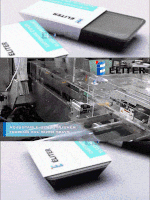Expanded polystyrene is recycled ‘at scale and in practice’ around the world, according to the Ellen MacArthur Foundation
2023-12-19
On March 30, 2023, the Foundation published its ‘Plastic Initiative 2023 Recycling Rate Survey’ in which expanded polystyrene (EPS) for insulating containers and protective packaging is no longer covered by the ‘Global Commitment’ (https://www.unep.org/new-plastics-economy-global-commitment), since the Ellen MacArthur Foundation recognizes that packaging and EPS transport packaging (insulators and protectors) are recycled at “scale and in practice” all over the world.
This marks a step forward for EPS industries that place sustainability and the circular economy at the center of their ambitions for a better Europe.

The excellent result of the EPS recycling rate in Europe
The Ellen MacArthur Foundation establishes very specific criteria when validating the recyclability of plastic materials: “The test and threshold for evaluating whether the recyclability of a packaging design is proven “in practice and at scale” for the Global Commitment are “Does this packaging achieve a post-consumer recycling rate of 30% in multiple regions, which together represent at least 400 million inhabitants?” These criteria are applied by the United Nations Environment Program in negotiations regarding the International Treaty on Plastic Pollution, a legally binding agreement on plastic pollution by 2024 agreed to by 175 nations around the world.
Through an initiative of the National EPS-branchen Association (Denmark), which met with the Ellen MacArthur Foundation to discuss the properties of EPS, data shared by the EPS industry demonstrated that EPS used for insulating containers and packaging protection meets the criteria to validate the recyclability of the material at “scale and in practice”, which is why they were taken into account by the Foundation.

In fact, in the European Union, the recycling rate of post-consumer EPS packaging is approximately 40%, while in North America the recycling rate exceeds 30% (above 50% in Japan, China and South Korea ). Some European countries stand out for their excellent recycling ratios: in Norway, for example, the recycling rate exceeds 70%, while in Denmark, Portugal, Belgium, Austria and Ireland it is over 50%. In addition, EPS recycling also exceeds 30% in Brazil.
If we talk about the specific case of Spain, the EPS recycling rate compared to the total packaging waste in all its flows during 2022 was 45%, a little above the European average.
After reviewing the data submitted, the Ellen MacArthur Foundation recognized that EPS fish boxes and protective appliance packaging made from EPS are not only recyclable, but actually recycled. EPS Branchen, member of EUMEPS and Danish National EPS Association, published a detailed note on the matter.

When EPS recycling rates in Europe exceed expectations
All data presented through government sources also showed that post-consumer recycling of EPS covers 35 countries in 4 regions of the world with a population of at least 4.2 billion people, thus exceeding the 400 million criteria established by the Ellen MacArthur Foundation. The EPS industry in the application of insulated containers and protective packaging not only meets these criteria, but exceeds them!
Additionally, when applying the Ellen MacArthur Foundation criteria to compare population to recycling assessment of other packaging materials, post-consumer recycling of EPS is the second most recycled plastic packaging measured by population. Looking only at government data and 2018 population, EPS is the third most recycled packaging material in the world. It should also be noted that insulating EPS packaging and protective packaging only represents a marginal share of plastic packaging produced worldwide, significantly below 0.2%.
Finally, these excellent results should also be put into perspective with the Conversio study, “The EPS Industry Journey towards Circularity”, published by EUMEPS, which also clearly demonstrates the commitment of the European EPS industries to recyclability and circularity. However, the entire European EPS industry is pleased to see that the efforts made in recent years to further increase recycling of the material in order to achieve circularity and continue to increase recycling have been recognized by the Ellen MacArthur Foundation.




